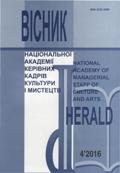ВІРТУАЛЬНА КУЛЬТУРА В ЕПОХУ ПОСТМОДЕРНУ:
ТУРИСТСЬКІ ПРАКТИКИ
Culture Virtual culture in the postmodern era: tourism practices
Author(s): Liubov BozhkoSubject(s): Anthropology, Communication studies, Sociology, Social history, Recent History (1900 till today), Tourism
Published by: Національна академія керівних кадрів культури і мистецтв
Keywords: virtual Culture; post-modernism; post-tоurist; virtual community; virtual tourism; CouchSurfing
Summary/Abstract: The purpose of the work. The socio-cultural tourism practices fully reflect processes caused by postmodernism as a culture and a special type of thinking and perception of the world. The goal of the research is to determine the transformations that occur with tourism practices in the contemporary postmodern culture under the influence of networking technologies of the virtual world. The research methodology is based on the cultural approach with the use of historical and logical methods. Indicated methodological approach allows to reveal and analyze virtual tourism practice as a new form of cultural relations. The scientific novelty of the work lies in the fact that some of the new travel practices are considered as a product of post-modernism, appeared in the conditions of widespread network technologies and virtual reality. Conclusions. Today we do not know what cultural effects virtual tourism and virtual travel community bring, but their development is a natural process. On the one hand their appearance is due to the presence of computer communications systems under the influence of which the perception of the world changes, on the other hand ‒ to the formation of the virtual culture, under the influence of which a new type of a tourist with special needs and behavior is born. Social tourism communities are a valuable tool for cultural exchange, personal and emotional growth and increasing of number of connections with other people. In addition, such online platforms provide a space for people who can participate in the formation of relationships in the fields of non-commercial tourism space. These relations are formed under the influence of expectations and values of individuals and create cultural realities.
Journal: Вісник Національної академії керівних кадрів культури і мистецтв
- Issue Year: 2016
- Issue No: 4
- Page Range: 11-15
- Page Count: 5
- Language: Ukrainian

